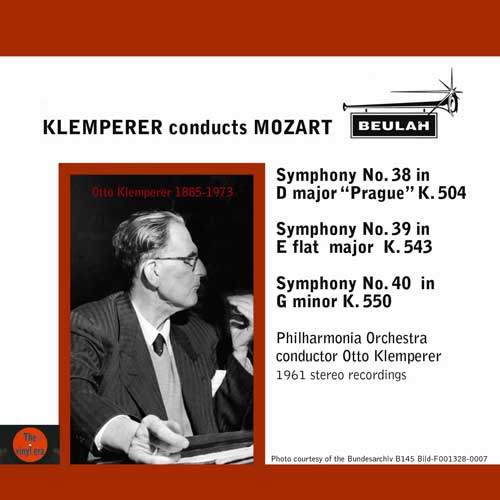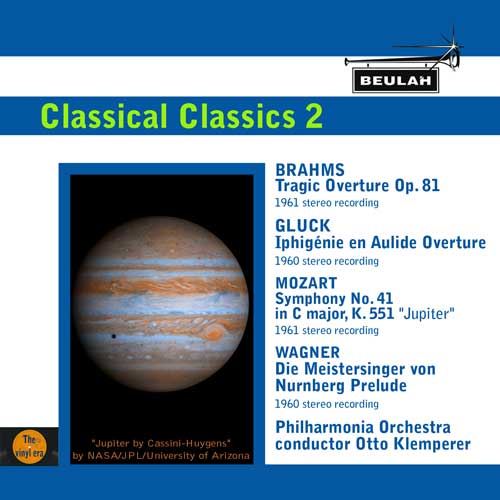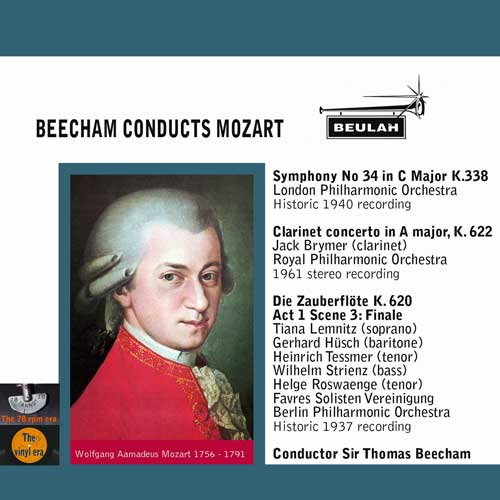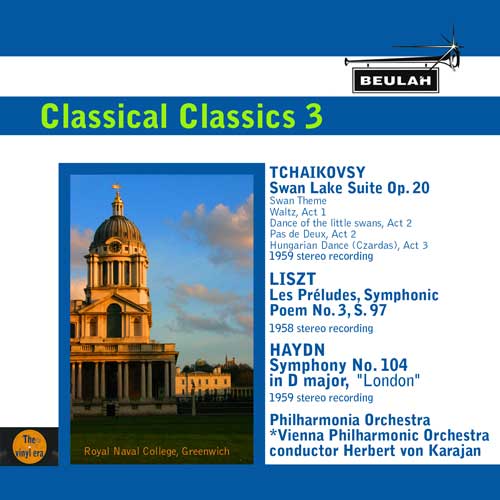|
|
New for February
New from iTunes
Many music lovers miss the sound from vinyl pressings.
Many others have yet to discover how pleasant the sound can be.
Most of our albums are mastered from vinyl LP pressings and earlier
recordings (before 1953) from 78 rpm discs. It is our ability to
recreate, in the digital age, the sound from the disc era that many of
our customers find most enjoyable.
Unlike modern digital recordings tracks in our
albums do contain some distortion, and the occasional surface noises,
but for many listeners these "defects" are soon forgotten.
"Muir Mathieson appears first with the
Sinfonia of London, the ad hoc orchestra which he founded in 1955,
consisting of players from the London orchestras, chiefly for film
music but also much employed by World Record Club, itself an offshoot
of EMI. This stylish recording of the Così fan tutte Overture first
appeared on LP with Eine Kleine Nachtmusik and Schubert’s Fifth
Symphony.
Beulah have made something of a speciality of Come scoglio, with
recordings featuring Suzanne Danco (2BX177), Teresa Stich-Randall
(1BX167) and this one with Helen Lawrence, already released on Beulah
Extra 8BX55. Reviewing Lawrence in a number of arias on various Beulah
Extra recordings in October 2010 I thought the Mozart the pick of a
fine bunch, with excellent support from orchestra and conductor and
more recent sound than on other Beulah reissues
.
Géza Anda was one of the first to record Mozart piano concertos in the
dual role of soloist and conductor. Though not universally well
received on their appearance, his recordings still sound stylish over
50 years on. What then seemed lacking in charm is more in tune with the
modern view of Mozart as anything other than a figurine on a pedestal.
If you want that older view of Mozart at its best, Beulah Extra have
Annie Fischer and Sir Adrian Boult in Piano Concerto No.20, K466
(1-3BX130), and No.23, K488 (5-8BX130).
We end as we began with the Sinfonia of London, this time conducted by
the young Colin Davis... I though the tempi are consistently somewhat
sedate, I still enjoy the performances, all well transferred by Beulah.
... Together they make an attractive package. The performances are all
still well worth hearing and all the transfers have been made with
Beulah’s usual care and skill."
Brian Wilson at
Music Web International
The release of this album was unfortunatley
delayed from December but it is now available at iTunes
New from Beulah Extra
Beulah Extra downloads are high quality 320kb/s MP3
files. They are not grouped into albums. You can buy any combination of
movements or works that you wish.
What the critics say
Here are some recent reviews by Brian Wilson
at
Music Web International
 |

|
"The Prague is certainly treated to some
measured tempi but there’s a
lightness of touch that’s as much a tribute to the excellence of the
early 1960s Philharmonia as to the conductor. The slow movement is a
touch slower than you may think ideal and Symphony No.39 follows too
hard on the heels of No.38 but overall I enjoyed this reissue. The
recording sounds almost brand-new.
With No.39 we enter deeper waters and it requires a different, more
serious approach, which it receives from Klemperer. ‘More serious’
doesn’t have to mean ‘heavy’ and there’s plenty of flow in the allegro
section of the opening movement, taken considerably faster than by Karl
Böhm in his recording with the BPO from much the same period . I like
Böhm’s Mozart – it hasn’t really dated – but I award the palm to
Klemperer in this movement.
The second movement is marked andante con moto. Klemperer’s tempo
is a little too slow for me – considerably slower than Böhm – and the
moto sometimes gets slightly lost but the compensation is that we are
encouraged to take the movement really seriously.
The allegretto third movement chugs a little – a stately minuet, but
that’s better than the breakneck speed on some more recent recordings
and the finale, with repeats duly observed, goes swimmingly; for once I
disagree with Trevor Harvey, whose reviews did much to inform my record
purchasing in the 1960s, and who thought Klemperer’s finale lacking in
humour.
Much as I enjoyed Klemperer’s account of No.39, however, there’s
another Beulah recording which I prefer, from Colin Davis with the
Sinfonia of London.
No.40 was released on LP with No.41 on Columbia SAX2486 (see
below). The opening movement is measured but far from heavy: if
anything, it’s a little lacking in power, but the affectionate account
of the slow movement – not a quality you might expect from Klemperer –
does a great deal to atone.
The recordings have come up sounding very well indeed. All in all
a worthwhile purchase."
Brian Wilson at
Music Web International
 |

|
" If you like Klemperer’s Mozart, you can
complete the set with his account of Symphony No.41 Jupiter, K551, also
recorded with the Philharmonia in 1961.
Having been somewhat critical of the earlier symphonies, I took my mp3
conversion of No.40, added No.41 and played them one after the other,
sitting in an armchair without the wherewithal to make notes, and
really enjoyed hearing them both.
This recording of the Tragic Overture, originally released with his
account of Symphony No.2 (Beulah 2BX114-7), is as good as it gets.
The Gluck, as arranged by Wagner, sounds a bit weighty in this
performance. The ponderousness is the joint fault of Wagner and
Klemperer, not Gluck, but the recording is exceptionally good for its
age. The Meistersinger, too, have sounded jollier but the quality of
the playing of the Philharmonia and the fulsome recording make up for
that. My wife, for whom this is one of her favourite pieces of music,
enjoyed Klemperer’s interpretation very much. There’s a touch of glare
on the high strings and a hint of blurring at the peaks but nothing to
worry about. "
Brian Wilson at
Music Web International
 |

|
" The sound in the symphony is dry but not at
all bad for its age and you would have to listen on headphones to hear
even the slightest hint of surface noise. No.34 doesn’t get too many
outings; it’s hardly in the same category as the great last six, Nos.
35-36 and 38-41, but it can sound charming in the right hands and
Beecham gives it all his affection
This a classic recording of the Clarinet Concerto, by no means outshone
by Brymer’s later recordings with Colin Davis (Philips Solo) and
Neville Marriner (Philips): all three are still among the best
available. The other two Brymer recordings remain in the catalogue but
this version with Beecham seems no longer easy to obtain in the UK, so
the Beulah album is worth having for it alone. Brymer and Beecham
linger unconscionably long in the slow movement, perhaps inspired by
the mistaken notion that Mozart knew his days were numbered. There’s no
evidence for that in his letters to Constanze at the time but, however
mistaken the idea may be, there’s no denying the beauty of this
performance.
The sound is a trifle thin by comparison with the Klemperer recordings,
made by another branch of EMI at around the same time, but more than
acceptable in this transfer.
Though the extract from Zauberflöte sounds fine for its date – better
than the 1940 Symphony No.34 – it’s not, for me, the ideal way to
complete this album – I enjoyed it so much that it made me want to hear
this recording of the whole opera, available from Naxos Historical
(8.110127/8 – review) or Nimbus (NI7827, 2 CDs – review) and still well
worth hearing.
These Klemperer and Beecham recordings, though very different, are well
worth reviving. "
Brian Wilson at
Music Web International
 |

|
" The record companies have been having
something of a field day recently in reissuing Karajan recordings from
his time with the Philharmonia and with the Berlin Philharmonic. For
those not wishing to invest in one of those bumper boxes, here is a
timely reminder of some of the best of his earlier recordings
The Beulah collection doesn’t really hang together as a programme
except as an example of Karajan’s conducting from before his time in
Berlin when much of what he recorded became somewhat too streamlined
for many listeners.
As a taster for the complete Swan Lake Karajan’s recording of the
Suite, if you’re not in the mood for the whole ballet, is about as good
as any.
Karajan’s Les Préludes is a little understated by comparison with some
other recordings, but none the worse for that. Though his BPO version
on DG is available in a number of combinations, this Philharmonia
recording appears otherwise only on the 12-CD Warner set (2564633623)
so the release on this album is particularly valuable. I haven’t been
able to hear the Warner transfer, but I doubt if it’s much better than
the Beulah.
Though first released by RCA, the Haydn recording was made by Decca and
it’s still available from them, coupled with Beethoven Symphony No.7 ,
on a 9-CD set.
If none of those couplings appeal, especially if you baulk at the idea
of buying a gigantic box, the Beulah transfer is good. The performance
is rather more plush than usual nowadays, falling slightly between the
two stools of Sir Thomas Beecham and Sir Colin Davis.
It’s with Davis and Jochum, however, that Karajan is most aptly
compared. Both, like him, use modern instruments.
I’d still go for one of those three for my Desert Island but this time
round I’ve grown to like the Karajan more than before and it would
certainly provide a more than satisfactory alternative, especially now
that it comes in tandem with two other attractive examples of his
pre-BPO days.
Unless you have already separately purchased the three components of
this album and if their placement together appeals, this is
another fine reissue from Beulah. "
Brian Wilson at
Music Web International
|
The items below are
adverts that will take
you
away from this site



|
|
